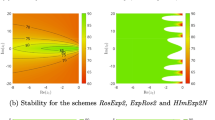Abstract
The key condition for the application of the Reduced Basis Method (RBM) to Parametrized Partial Differential Equations (PPDEs) is the availability of affine decompositions of the equations in parameter and space. The efficiency of the RBM depends on both the number of reduced basis functions and the number of affine terms. A possible way to reduce the costs is a partitioning of the parameter domain. One creates separate RB spaces (Haasdonk et al., Math. Comput.Model. Dyn. Syst. 17(4), 423–442, 2011) and affine decompositions (Eftang and Stamm, Int. J. Numer. Methods Eng. 90(4), 412–428, 2012) on each subdomain. Since the solutions are supposed to be smooth in parameter, the variation of the solutions on a subdomain becomes small and only few basis functions and affine terms are needed. Based upon the Empirical Interpolation Method (EIM) (Barrault et al., C. R. Math. Acad. Sci. Paris 339(9), 667–672, 2004 and Tonn, 2012), we generalize the existing partitioning concepts to arbitrary input functions with possibly unknown, high-dimensional, or even without direct parameter dependencies. No a-priori information about the input is necessary. We create affine decomposition and partitions without the knowledge of either an explicit description of the parameter domain or of the form of the partitions. The main idea is to perform several EIMs such that different parts of the family of possible input functions are covered. For a new input in the online stage, the coefficients of the resulting affine decomposition are used for the assignment to the appropriate EIM. An application includes PPDEs with stochastic influences (Chen et al., Math. Model. Numer. Anal. 48(4), 943–953, 2014, Haasdonk et al., SIAM/ASA J. Uncertain. Quantif. 1, 79–105, 2013 and Wieland, 2013). For some probability space, the parameter domain is now associated with the set of possible random outcomes. Hence, the elements of the parameter set are not parameters in classical sense and there often is no explicit description of the class of outcomes.
Similar content being viewed by others
Explore related subjects
Discover the latest articles and news from researchers in related subjects, suggested using machine learning.References
Barrault, M., Maday, Y., Nguyen, N.C., Patera, A.T.: An ‘empirical interpolation’ method: application to efficient reduced-basis discretization of partial differential equations. C. R. Math. Acad. Sci. Paris 339(9), 667–672 (2004)
Chen, P., Quarteroni, A., Rozza, G.: A weighted empirical interpolation method: a priori convergence analysis and applications. ESAIM: Math. Model. Numer. Anal. 48(4), 943–953 (2014)
Eftang, J.L., Knezevic, D.J., Patera, A.T.: An hp certified reduced basis method for parametrized parabolic partial differential equations. Math. Comput. Model. Dyn. Syst. 17(4), 395–422 (2011)
Eftang, J.L., Patera, A.T., Rønquist, E.M.: An “hp” certified reduced basis method for parametrized elliptic partial differential equations. SIAM J. Sci. Comput. 32(6), 3170–3200 (2010)
Eftang, J.L., Stamm, B.: Parameter multi-domain hp empirical interpolation. Int. J. Numer. Methods Eng. 90(4), 412–428 (2012)
Gordon, W.J., Hall, C.A.: Transfinite element methods: blending-function interpolation over arbitrary curved element domains. Numer. Math. 21, 109–129 (1973)
Grepl, M.A., Patera, A.T.: A posteriori error bounds for reduced-bias approximations of parametrized parabolic partial differential equations. M2AN Math. Model. Numer. Anal. 39(1), 157–181 (2005)
Haasdonk, B., Dihlmann, M., Ohlberger, M.: A training set and multiple bases generation approach for parameterized model reduction based on adaptive grids in parameter space. Math. Comput. Model. Dyn. Syst. 17(4), 423–442 (2011)
Haasdonk, B., Urban, K., Wieland, B.: Reduced basis methods for parametrized partial differential equations with stochastic influences using the Karhunen-Loève expansion. SIAM/ASA J. Uncertain. Quantif. 1, 79–105 (2013)
Maday, Y., Nguyen, N.C., Patera, A.T., Pau, S.H.: A general multipurpose interpolation procedure: the magic points. Commun. Pure Appl. Anal. 8(1), 383–404 (2009)
Maday, Y., Stamm, B.: Locally adaptive greedy approximations for anisotropic parameter reduced basis spaces. SIAM J. Sci. Comput. 35(6) (2013)
Patera, A.T., Rozza, G.: Reduced Basis Approximation and A Posteriori Error Estimation for Parametrized Partial Differential Equations (2006). Version 1.0, MIT Cambridge MA (2006)
Peherstorfer, B., Butnaru, D., Willcox, K., Bungartz, H.J.: Localized discrete empirical interpolation method. SIAM. J. Sci. Comput. 36(1), A168—A192 (2014)
Rozza, G., Huynh, D.B.P., Patera, A.T.: Reduced basis approximation and a posteriori error estimation for affinely parametrized elliptic coercive partial differential equations: Application to transport and continuum mechanics. Arch. Comput. Methods Eng. 15(3), 229–275 (2008)
Tonn, T.: Reduced-basis method (RBM) for non-affine elliptic parametrized PDEs (motivated by optimization in hydromechanics). Ph.D. thesis Ulm University, Ulm (2012)
Veroy, K., Patera, A.T.: Certified real-time solution of the parametrized steady incompressible Navier-Stokes equations: rigorous reduced-basis a posteriori error bounds. Int. J. Numer. Methods Fluids 47(8-9), 773–788 (2005)
Wieland, B.: Reduced basis methods for partial differential equations with stochastic influences. Ph.D. thesis, Ulm University (2013)
Yano, M., Patera, A.T., Urban, K.: A space-time hp-interpolation-based certified reduced basis method for Burgers’ equation. Math. Models Methods Appl. Sci. 24(09), 1903–1935 (2014)
Author information
Authors and Affiliations
Corresponding author
Additional information
Communicated by: Jan Hesthaven
This paper was partly written while B.W. was funded by the state of Baden-Württemberg according to the State Postgraduate Scholarships Act (Landesgraduiertenförderungsgesetz).
Rights and permissions
About this article
Cite this article
Wieland, B. Implicit partitioning methods for unknown parameter sets. Adv Comput Math 41, 1159–1186 (2015). https://doi.org/10.1007/s10444-015-9404-5
Received:
Accepted:
Published:
Issue Date:
DOI: https://doi.org/10.1007/s10444-015-9404-5
Keywords
- Model reduction
- Reduced basis method
- Empirical interpolation method
- Parametrized partial differential equations
- Adaptive partitioning




